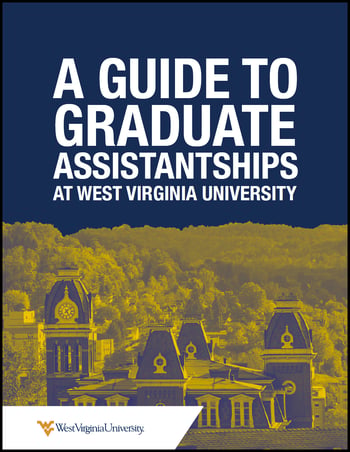
For many graduate students, securing a graduate assistantship is critically important to their grad school experience and longterm career trajectories. The real-world, practical professional experience that a graduate assistantship position offers is invaluable to students interested in pursuing a teaching-focused or research-driven career.
We spoke to one graduate assistant — Shelby Bradford — who is pursuing a degree through the Immunology and Microbial Pathogenesis program at West Virginia University.
Here's what she had to say about her graduate assistantship experience.
Tell us a little bit about yourself. What's your academic background?
I am Shelby Bradford, and I’m twenty seven and currently living in Morgantown. I’ve lived here since I came to West Virginia University for college, where I graduated from the Immunology and Medical Microbiology program.
Tell us about your field of study. Why did you choose WVU’s graduate program?
As a graduate student, I am in the Immunology and Microbial Pathogenesis program. This program is obviously very similar to my undergraduate degree. Basically, I came to college thinking that the Black Death was the coolest thing, and I wanted to learn about infectious diseases. But then I learned a lot about the immune system and now think it is equally fascinating.
I more or less fell down the rabbit hole of immune systems and pathogens!
I was coming to graduate school because I wanted to be a professor because professors were the people who inspired my interest in pursuing graduate school in the first place, so getting teaching experience was very important to me.
West Virginia University stood out to me because it was the only university out of six or seven I considered that made career exploration and management an integrated part of the curriculum.
This was invaluable to me.
I am also one of the lucky grad students who did not need to do anything to secure my assistantship; it was part of my acceptance offer. I receive a tuition waiver and living stipend, which helps me to offset the cost of graduate school while gaining invaluable teaching experience.
What kind of responsibilities did you have as a graduate assistant?
My assistantship is contingent upon being a full-time student and maintaining satisfactory academic progress. Because of the department I entered through my graduate program (IMP), I did have to complete two separate semesters serving as a teaching assistant. However, this responsibility is not required as part of the assistantship from the WVU Biomedical Sciences Graduate Program, as other programs and departments don’t have this requirement.
I do think that my teaching assistant experience was extremely beneficial, and although I’m not one, many graduate students in STEM have prospects of being tenure-track professors. However, I think they often overlook the reality that this will involve teaching, and without a required teaching assistant position, many never actually get experience in this before their first professorship.
What kind of real-world, practical skills did the graduate assistant position provide you?
I got experience standing in front of an audience of people with the intent of conveying information to them. Some of these positions also included preparing lecture materials and doing laboratory demonstrations, which requires not just a level of personal mastery but also consideration in the best way to communicate the information.
Because most of my TA positions were lab-based, I actually sought out additional opportunities to teach as a guest lecturer in undergraduate courses to further practice these skills. Doing so built tremendous skills in communication and time management.
How has WVU prepared you for a meaningful career in your field?
The single most impactful experience for me as a graduate student at WVU was the incorporation of career development into the curriculum. This is called “experiential learning;” students are encouraged to identify an experience — an internship, training, workshop, or other activity — which they can coordinate related to a career.
I think the novelty of learning-by-doing is underutilized by students; most just go to another lab, learn some skill they may or may not use in their research, and return with their box checked. But for me, it gave me the opportunity to connect and work with likeminded professionals who were passionate about education.
If you could give one piece of advice to a prospective graduate assistant, what would it be?
If you need something or are interested in pursuing something, talk to someone. The job of your advisors and mentors (and the graduate office) is to support you and help you secure the resources you need to be successful in your post-graduate life.
Sometimes you don’t know exactly what you need, but you have some idea. That’s okay! I made the mistake of thinking I needed to have all the elements figured out before I contacted someone, and that was entirely wrong. These people can help you figure out what you need and where you can find support or resources to do it.
So, the number one thing you should look for in a program is a supportive network of people. Ask questions like “how do you support students with X interests?” or “do you have resources for Y?” either in an email before you apply or during your interview.
Ready to talk to learn more about the benefits of graduate assistantships? Connect with WVU!
At West Virginia University, we aim to produce ethical, marketable professionals, and we are committed to cultivating a community that values diversity, inclusion, and academic excellence.
By offering graduate assistantships that prioritize experiential learning and practical application of skills, we contribute to the thousands of transformative professionals who enter countless industries ready to impact positive change.
If you think that choosing graduate school at WVU could be the right decision for your academic and professional future, then we encourage you to get in touch with us. You can request more information, visit our Resource Library, or review our admissions requirements.










